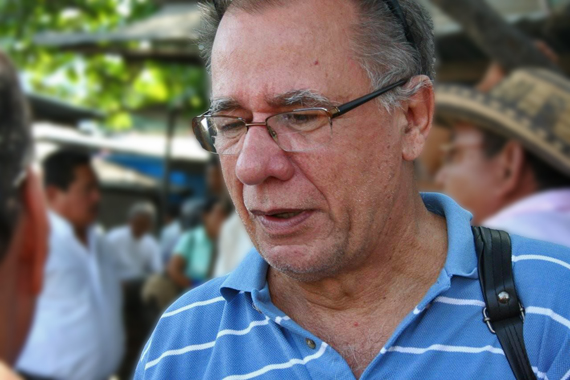|
Next Dec. 6 will mark the 82nd
anniversary of the Ciénaga workers’ massacre, committed in 1928 in Colombia by
the United Fruit Company, now Chiquita Brands. This atrocious crime is
brilliantly reported in the book “Masacre en las Bananeras,” written by
sociologist Carlos Payares González. IUF Latin America signed an agreement with
several labor organizations to launch a new edition and distribute it worldwide.
Sirel spoke with the author.
Colombia’s
United Workers Federation (CUT), the National Agro-Food Union of Colombia
(UNAC), the
Argentinean Union of Rural Workers and Stevedores (UATRE), the
National Union of Agroindustry Workers of Colombia (SINTRAINAGRO),
and Rel-UITA (IUF Latin America) have signed an agreement to
publish an updated edition of Carlos Payares González’ account of the massacre
and distribute it broadly nationally and internationally.
-Where does the
idea for this book originate?
-In 2008 we
felt we needed to commemorate the 80th anniversary of the strike
staged by United Fruit Company workers in the department of Magdalena,
Colombia, and the subsequent massacre committed by that company.
The aim of the
book is not just to present the bare facts of what happened; it is also an
attempt to recreate the conditions and atmosphere of the time in which these
events occurred, retrieving on paper the lives of the different social actors
involved, and providing a dynamic content that covers economic, political,
social, and cultural aspects.
|
Today it is national
states that, through norms and regulations that did not exist 80
years ago, are allowing large transnational corporations to do the
same thing that the United Fruit Company did back then; only now
they’re doing it “legally.” |
-A work not to
be forgotten…
-Exactly, as it
recovers the historical memory of banana workers and the area’s social or
collective memory; that is, it shows the fundamental role played by popular
sectors of the population, which is often erased from mainstream history books.
The intention is for this to be a “wakeup call” for all those who never heard of
these events or who have forgotten them.
-It is also a
way to prevent us from forgetting what the passage of the United Fruit Company
through Latin America meant for the continent, and what transnational
corporations are still doing today…
-What
the United Fruit Company, now Chiquita Brands, did throughout
Latin America is in a sense what transnational corporations are still doing
today, although in a somewhat more subtle and camouflaged manner.
Today it is
national states that, through norms and regulations that did not exist 80 years
ago, are allowing large transnational corporations to do the same thing the
United Fruit Company did back then; only now they’re doing it “legally.”
The United
Fruit Company’s history marks the beginning of the continent’s
neo-colonialist or enclave era. It’s the history of horror in economy and
politics, of despotic power, and state manipulation.
And it’s the history of how
democracy was an obstacle to the interests of U.S. financial capital and large
corporations.
Capitalism has
not changed in essence, and neither have the demands of social sectors that are
fighting for a decent life. These companies have only changed their names, and
they basically represent the same interests, which result in the same violence,
the same repression, and the same retaliation against workers.
The history of the United Fruit
Company is part of the history of Latin America.
-Rel-UITA and a
group of other labor organizations have decided to launch a new edition of your
book and distribute it worldwide. How important is this decision?
-I’m very
surprised, and it is an honor for me that organizations committed to their
people’s struggles are recognizing this effort to recover the historical and
social memory of an episode that marked Latin American history.
 |